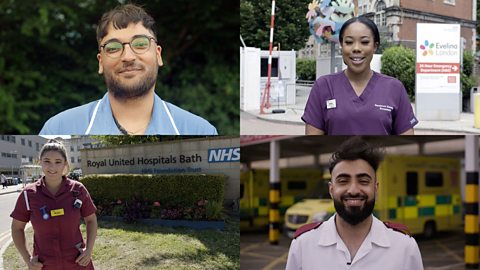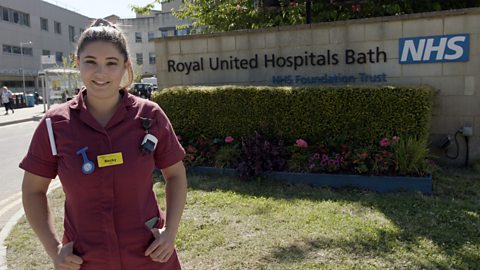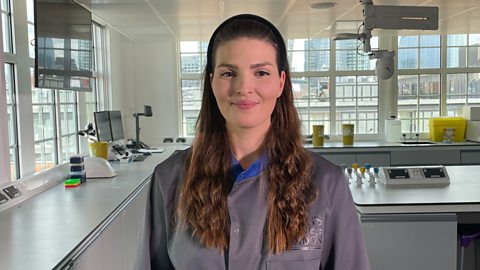Meet Nahom, 30, a phlebotomist at a private hospital in London. Find out more about his job and journey into the role.
Part of our Bitesize world of work series.
Being understanding, patient and caring is fundamental to the job.
Nahom:
My name is Nahom and I am a phlebotomist.
Being understanding, patient and caring is fundamental to the job.
My role as a phlebotomist is to take blood from the patient. Make sure it's done properly, efficiently and it is sent to the laboratory for testing.
Before the patient comes in, I always prep all the things I need. I make sure everything is sanitised beforehand. The first thing I do is greet them with a nice smile, making sure they feel comfortable, making sure they feel heard before we do the blood test. Making sure they feel safe - it makes their experience a lot better. It makes my experience a lot better as well.
Once I do sit down, we make sure their arm is sanitised. We tie an armband on the arm, making sure the veins come up to the surface, which allows me to actually take the blood test. Once we've done the blood test, make sure it's clotting, make sure I give them cotton wool to hold down the wound.
Some of the other skills that I apply is communication. Communication is a very important skill, since you have to communicate with doctors, patients, surgeons.
Another basic skill as a phlebotomist that you'd be required, is being able to actually take blood. So, you need to feel comfortable taking a blood test or seeing the sight of blood, or handling blood at times.
How I got into phlebotomy - when I was studying my Bachelors Degree in university, my friend was doing the phlebotomy course. I immediately thought that was interesting for me.
After doing my own research, it made sense for me to go into phlebotomy because it aligned with my degree, and also I liked the idea of working in a hospital.
Sofiane, Team Leader:
Nahom is a great team player. He cares about his team and his colleague and he's always challenging his team. He shares all his knowledge with his team and all his team members look at him for guidance. He is caring and confident, he's well trained, he's a good, good listener and he gives others skill very quickly.
Nahom:
When I was in secondary school, I took my GCSEs. The most important subjects that applied to phlebotomy, I would say, is Maths, English, Science. Having a basic knowledge of science, it helps you a lot. It makes your experience a little bit faster and it makes it more easy to understand. Basic Maths is essential for a phlebotomist and also being able to communicate.
Progression in phlebotomy is very wide and you can give in different avenues. You can take management skills, which one day hopefully you can become a team leader or team manager. Maybe a department leader. One of my goals is to become a Senior Phlebotomist, which means a bigger role and more responsibility within the department.
What I like most about my role is every day is different. It keeps you going, it keeps you hungry, it keeps you motivated. When you meet different kinds of people from different walks of life, it's very interesting. You have very interesting things to talk about. At the end of the day, they are here to get better so, being part of that process is always a good feeling.
Not everybody is able to the job that I do, it also makes me feel proud.
- Phlebotomists are part of the healthcare system. They take blood samples from patients which are then examined in a laboratory to help diagnose diseases and conditions.
- An important part of the role is to feel comfortable seeing and handling blood. Nahom uses technical skills to perform the medical procedure safely, and communication and interpersonal skills to work in a team and put his patients at ease.
- Maths, Science and English are subjects that have been most useful to Nahom for the role. They help him to communicate with others and understand doctors, surgeons, and patients.
- Nahom studied Medical Physiology at university and became interested in phlebotomy during his course. While studying, he completed his training to become a phlebotomist. He then applied for the job and has been in the role for three years.
- Nahom loves the challenge of his job and the variety of the role, especially knowing that he helps people everyday.

Top tips
- Get experience by volunteering. This will give you a good idea of what the job involves.
- Find out if the job could be suitable for you. You need to be comfortable taking and handling blood.
- Interpersonal skills are vital. If you're naturally good at making people feel at ease, phlebotomy might be perfect for you.

What to expect if you want to be a phlebotomist
- Phlebotomist average salary: NHS bands 2-3. Read more about NHS bands. Salaries will differ in private healthcare.
- Phlebotomist typical working hours: 40 to 42 hours per week.
What qualifications do you need to be a Phlebotomist?
You could get into this role via a college course, an apprenticeship, working towards the role, or applying directly.
Sources: LMI for All, National Careers Service.
This information is a guide and is constantly changing. Please check the National Careers Service website and the NHS Health Careers website for the latest information and all the qualifications needed.
For careers advice in all parts of the UK visit: National Careers Service (England), nidirect (Northern Ireland), My World of Work (Scotland) and Careers Wales (Wales).

Why I love my healthcare career. video
A series of ten short films that reveal lesser known roles in the healthcare sector.

Becky: healthcare assistant. video
Becky is a healthcare assistant at Royal United Hospitals Bath.

Lucinda: forensic scientist. video
Lucinda is a forensic scientist, testing and analysing evidence to help solve crimes.
